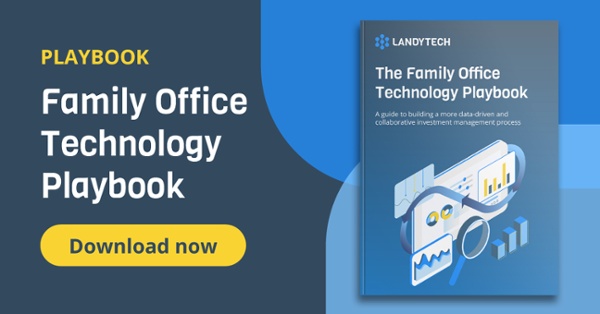Written by Landytech
8 Jan 2026
Family offices are under pressure from all sides. Markets are more complex, families are more global, and expectations around transparency and control keep rising. In response, many offices are refocusing on a smaller number of technology priorities that support clearer decision-making, stronger oversight, and long-term resilience.
Below are the key trends we see emerging across the industry, based on conversations with our family office clients, and the latest industry research.
1. Finding the right investments is getting harder, not easier
One of the most common frustrations family offices raise today is deal flow. UBS reports that more than half of family offices plan to increase exposure to private markets, yet many cite sourcing quality opportunities as a major constraint. The challenge is not a lack of deals, but a lack of relevant deals.
This is driving interest in technology platforms that help curate and organise investment ideas. Families want a structured pipeline that brings together alternative investment opportunities, links them to their investment objectives, and keeps supporting materials in one place. The goal is to spend less time searching and more time deciding.
2. Data aggregation moves to the centre of operations
Most family offices still operate across multiple banks, asset managers and custodians. According to UBS research, the average family office works with more than five financial institutions. Without automation, that means manual work, inconsistent numbers and slow reporting.
In 2026, data aggregation is no longer a nice to have. Offices are investing in platforms that automatically pull data from multiple sources, validate it and store it centrally. A single source of truth reduces errors, speeds up close processes and gives decision-makers confidence that they are looking at the right numbers.
3. Analytics move from hindsight to foresight
Reporting on what happened remains important, but families increasingly want clearer visibility into what comes next. Alongside traditional analysis of past performance, there is growing demand for tools that forecast cash flows and test how prospective investments would fit alongside existing holdings. This helps teams understand the impact on exposure, liquidity, and balance before new decisions are made.
4. Reporting expectations keep rising
Family office reporting has changed. Static PDF packs are giving way to interactive dashboards that can be explored in meetings or shared securely with stakeholders. According to JPMorgan Private Bank, over 60% of wealthy families now expect more frequent and more customised reporting.
The shift is not just about visuals. It is about trust. Clear, consistent reporting that ties back to underlying data helps families stay aligned and reduces friction between generations, advisors and operating teams.
5. Cybersecurity is now a board-level issue
Cyber risk has moved from the IT checklist to the board agenda. Recent private bank research shows that cyber incidents are one of the top operational risks cited by family offices globally. High-profile cases of fraud and social engineering have only sharpened the focus.
For family offices, cybersecurity is not just about firewalls. It is about access controls, audit trails and knowing who can see what data. Technology platforms that embed strong security practices reduce risk without slowing teams down.
6. Data governance matters more than ever
As data volumes grow, so does the need for control. Families are asking tougher questions about where their data lives, who owns it and how portable it is. This is especially important as offices adopt more cloud-based tools.
Forward-looking family offices are prioritising clear data governance. That means defined ownership, physically separated data environments where possible, and the ability to extract data cleanly if they change providers. Transparency beats convenience when long-term wealth is at stake.
7. Fewer systems, better outcomes
Many family offices are actively reducing the number of tools they rely on. Fragmented systems create duplicated work, reconciliation issues, and unnecessary security risk. Family office leaders consistently point to operational complexity as a drag on efficiency, particularly for lean teams.
Family office teams are typically small, and most do not want to spend time maintaining API integrations or managing complex technology stacks. There is a growing expectation that technology providers deliver joined-up solutions, with investment data and accounting data aligned on a single, reliable dataset. When aggregation, analytics, reporting, workflows, and books of record all sit in one place, teams spend less time fixing data and more time making decisions.
8. Technology supports governance, not replaces it
Technology cannot fix poor governance, but it can support good governance. Clear reporting, documented workflows and consistent data make it easier for investment committees and family boards to do their jobs.
As families prepare for generational transitions, having reliable systems in place reduces dependency on individuals and protects institutional knowledge.
9. Investment decisions rely on better information, not more information
Goldman Sachs’ 2025 Family Office Investment Insights show family offices increasing allocations to public equities and private credit while reducing excess cash. Managing this shift requires confidence in liquidity, exposure, and downside risk across both liquid and illiquid assets.
CIOs increasingly need analytics that model portfolio cash flows, funding requirements, and concentration across public and private markets. The challenge lies in combining fast-moving public market data with slower, manager-reported private data into a single, reliable view that supports decisions before capital is committed.
10. The direction of travel is clear
Family offices in 2026 are not chasing every new technology trend. They are investing in strong foundations: clean data, trusted analytics, clear reporting, robust security, and transparent governance.
These basics make it easier to understand risk, explain decisions, and think long term rather than react to short-term market movements. They also support continuity, helping families bring the next generation into investment discussions with clarity and confidence.
Offices that get these fundamentals right are better positioned to steward wealth across generations, manage risk consistently, and have more constructive conversations with stakeholders.
Final thoughts
The most successful family offices in 2026 treat technology as a support for better judgement, not an end in itself. As portfolios grow more complex and teams remain lean, the focus is shifting toward foundations that improve visibility, control, and confidence across investment decisions, cash flows, operations, and governance.
For anyone considering family office trends in 2026, the takeaway is clear. Strengthen the fundamentals, and the office is far better equipped to navigate change, steward wealth long term, and bring the next generation into the conversation.
Related Content

How your family office should be sourcing wealth data
As today’s UHNW become more geographically dispersed and family officesbecome more sophisticated in their investment functions and allocation strategies,portfoliosnowconsist of multiple asset classes, custodians and currencies, and investments...
-1.jpg)
5 ways to improve productivity in your family office
As family offices attempt to modernise, many are facing productivity challenges due to out-of-date, disparate internal systems andheavily manual processes. Naturally, there are inherent risks associated with such inefficiencies, including missed ...
/Blog%20and%20content%20images/Private-Asset-Reporting-Blog_v01.jpg)
The Top 5 Alternative Investment Reporting Challenges for Family Offices
For many years, alternative investments including private equity, hedge funds, real estate were seen as nothing but satellite allocations in the portfolios of asset owners. This made the job of family offices comparatively simpler when it came to...



